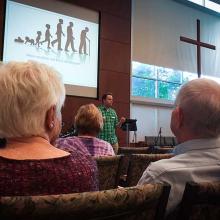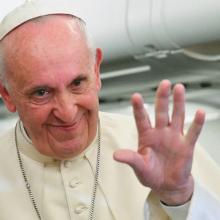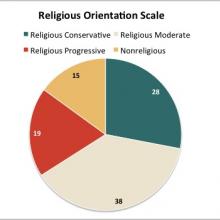Reformation
Luther esteemed the Church of Ethiopia because he thought Ethiopia, located far beyond the orbit of the Roman Catholic Church, was the first nation in history to convert to Christianity.
Luther's is the story of “how an obscure university professor developed a commercial identity through skillful exploitation of the high-tech media of his day.”
In the American church, where the right of the individual is sacrosanct, the ability to choose a church is protected with greater vigilance than the possible immoral consequences of that choice. The current segregation of congregations continues to be perpetrated and justified by the idolatry of choice.
“A lot of times churches are trying to preserve the legacy of who founded the congregations founded long ago,” said Elizabeth Eaton, the presiding bishop of the ELCA. “When you try to hold on to something so tightly, you strangle it. Taking a risk while being faithful to the core message of grace is my advice.”
Amid ceremonies this year marking the 500th anniversary of the Reformation, one of Protestantism’s leading branches has officially said it now agrees with the Vatican on the main issue at the root of its split from the Roman Catholic Church half a millennium ago.
A week after a terrorist bomb killed more than 20 and left scores injured, the people of Manchester will make their way through the streets of their grief-stricken city in one of its most traditional and religious events: the Whit Walk.
This will be a moment where the old Manchester meets the new, when the Christian tradition of the walk, commemorating the Feast of Whitsun — or Holy Trinity — meets the secular rituals that have come to define public mourning since this increasingly irreligious nation said goodbye to Princess Diana, who died exactly 20 years ago.
The fact that none of the five are Italian, and none hold Vatican positions, underscores Francis' conviction that the Church is a global institution that should become increasingly less Italian-centric.
All was apparently going fine until Micha Brumlik, a retired Frankfurt University education professor and respected Jewish commentator, wrote last June that the popular toy was “anti-Jewish, if not even anti-Semitic.”
The problem, he said, was the inscription on the open pages of the Bible that the Playmobil Luther holds. On the left is written in German: “Books of the Old Testament. END,” while the right page says “The New Testament, translated by Doctor Martin Luther.”
Tackling a delicate issue, as it begins its yearlong celebration of the Reformation’s 500th anniversary, Germany’s main Protestant church has officially renounced its mission to convert Jews to Christianity.
In practice, the Evangelical Church in Germany (EKD), made up of 20 regional Lutheran, Reformed, and United churches, mostly gave up efforts to convert Jews in the decades after the Holocaust, and closing that chapter should have been a formality.
Pope Francis leaves on Monday, Oct. 31 for an overnight trip to Sweden, a historically Protestant country that today is one of the most secular in the world.
The visit is to mark the start of observances of next year’s 500th anniversary of the Reformation, which traditionally dates from Oct. 31, 1517, when Martin Luther nailed his 95 Theses to the door of a German cathedral.

Image via Frank Gaertner/Shutterstock.com
Catholics and Lutherans have made another step toward joint commemoration of the 500th anniversary of the Reformation in 2017 by issuing common liturgical guidelines for ecumenical services to mark the occasion. The guidelines, in a booklet called “Common Prayer,” provide a template for an ecumenical service, complete with suggested prayers, appropriate hymns, and themes for sermons.
Just over fifty-three years ago, a huge wall was built, a mighty fortress – a wall around East Berlin, a wall to keep out and a wall to keep in. This wall isolated people and forcefully molded them into a single, straight, dreary one-dimensional way of living. The wall represented an oppressive system without cracks, without breaks, without life.
Almost 500 years ago, a monk by the name of Martin Luther felt the pressures of another oppressive system, one in which a person was never sure of God or God’s mercy, one in which a person could even pay to climb the stairway to heaven quicker and easier. In many aspects, the church itself had become a fortress, dictating who was in and who was out.
Every system, every culture, every community risks succumbing to the temptation of shutting borders and protecting an identity. We are quickly seduced into the illusion of absolute control and power. Brick by brick, wall by wall, suspicion by suspicion, power is built, oppression takes hold. We construct an identity, a security, a world. We construct our own way to heaven. (Or is it to a ghetto?)
Who or what can defeat and break the walls, the towers, the fortresses we construct? Who or what can overcome oppression in the land? Where do we turn when creation shakes and societies are in an uproar?
In an unusually informal video made on a smartphone held by a Pentecostal pastor, Pope Francis called on all Christians to set aside their differences, explaining his “longing” for Christian unity.
The seven-minute video, which was posted on YouTube, was made during a Jan. 14 meeting with Anthony Palmer, a bishop and international ecumenical officer with the independent Communion of Evangelical Episcopal Churches. Italian news reports say that the pope and Palmer knew each other when Francis served as the archbishop of Buenos Aires.
In his remarks, part of a 45-minute video, Francis said, in Italian, that all Christians are to blame for their divisions and that he prays to the Lord “that he will unite us all.”
There is a lopsided divide in America about what it means to be a religious person, with a majority believing that it’s about acting morally but a strong minority equating it with faith.
Nearly six out of 10 Americans (59 percent) say that being a religious person “is primarily about living a good life and doing the right thing,” as opposed to the more than one-third (36 percent) who hold that being religious “is primarily about having faith and the right beliefs.”
The findings, released Thursday, are part of a report by the Public Religion Research Institute and the Brookings Institution that aims to paint a more nuanced picture of the American religious landscape, and the religious left in particular.
VATICAN CITY — Lutheran leaders have warned the Vatican that the creation of a structure to welcome conservative Lutherans into the Catholic Church would harm dialogue and damage ecumenical relations.
In 2009, Pope Benedict created a special church structure, called an ordinariate, to allow disgruntled Anglicans to convert to Catholicism while maintaining bits of their traditions and culture.
Ordinariates have been created in the U.S., England and Australia, attracting hundreds of conservative Anglicans who oppose female and gay bishops and who seek greater lines of authority.
In recent weeks, senior Vatican officials publicly suggested the creation of a similar structure for disaffected Lutherans; the idea was first floated last October by Cardinal Kurt Koch, the Vatican chief ecumenist.
According to Catholic media reports, Archbishop Gerhard Ludwig Mueller, who heads the Vatican’s doctrinal office, said on Jan. 11 that if Lutherans asked for the creation of an ordinariate, the Vatican would consider their request.
Mueller’s words were swiftly rebuked by the Rev. Martin Junge, general secretary of the Lutheran World Federation. “The creation of such a special structure would have deep ecumenical repercussions,” he warned on Jan. 18.
Today is the day we remember the Protestant Reformation. On Oct. 31, 1517 Martin Luther, my denomination’s namesake, nailed his 95 Theses on the church door in Wittenburg. It was the beginning of a new movement that brought many changes to the Christian church. Perhaps the change I am most thankful for (other than a new awareness of justification by faith alone, simul iustus et peccator, and imputed righteousness of course) is that the Reformation paved the way for the Bible to be placed in the hands of the people. Before Luther’s German translation was completed in 1534, which happily coincided with advancements in the printing press, it was virtually impossible for any non-clergy Christians to get ahold of, much less read, the book we take for granted.
Individual faith and the ability to study this book for ourselves is a benefit we don’t even stop to consider. I grew up with more Bibles in my home than we could ever use and have countless different versions now in my office. And yes, there are still some places where access to information and printed text is hard to come by, but at least here, God’s Word is always at our fingertips, if we want it to be.
When I was ordained as a "Minister of Word and Sacrament" in the Reformed Church in America, a denomination that began in 1628, I imagined that I was being ordained to a church that was "reformed and always reforming!" (Emphasis mine).
Reformata et semper reformanda was a theme of the Reformation, which Martin Luther kicked off on Oct. 31, 1517 when he nailed his Ninety-Five Theses to front door of Castle Church of Wittenberg, Germany.
But rather than reviewing history from a half-millennia ago, let me explain what I hoped for 22 years ago, when I was ordained.
Albania was perhaps the most closed society in the world during the Cold War, with absolutely ruthless persecution of all religion. Churches were destroyed in every corner of that country. Clergy were eliminated. Worship was outlawed. And enforcement was brutal.
When Communism fell, and the country opened for the first time in decades, the Albanian church began a miraculous process of rebirth. We heard the moving story of the Albania Orthodox Church, rebuilding countless church structures, but even more importantly, restoring faith in the hearts of its people. I've known its leader, Archbishop Anastasios, from past encounters at the World Council of Churches, and he surely is a saint. The revival of religious faith in Albania and its compassionate service to those in need is a magnificent story of the church's witness, and the Spirit's power.
A week or two after the 2004 election, I was dining with some friends in New York when the conversation turned to religion and politics -- the two things that you're never supposed to discuss in polite company.
George W. Bush had just been re-elected with the help of what was described in the media as "evangelical voters." And knowing that I am an evangelical Christian, my friends were terribly curious.
"What, exactly, is an evangelical?" one gentleman asked, as if he were inquiring about my time living among the lowland gorillas of Cameroon.
I suddenly found myself as cultural translator for the evangelical mind.
"As I understand it," I began, "what 'evangelical' really means is that a person believes in Jesus Christ, has a personal relationship with him and because of that relationship feels compelled to share their experience of God's love with other people. "How they choose to share that 'good news' with others is entirely up to the individual. Beyond that, the rest is details and style."














